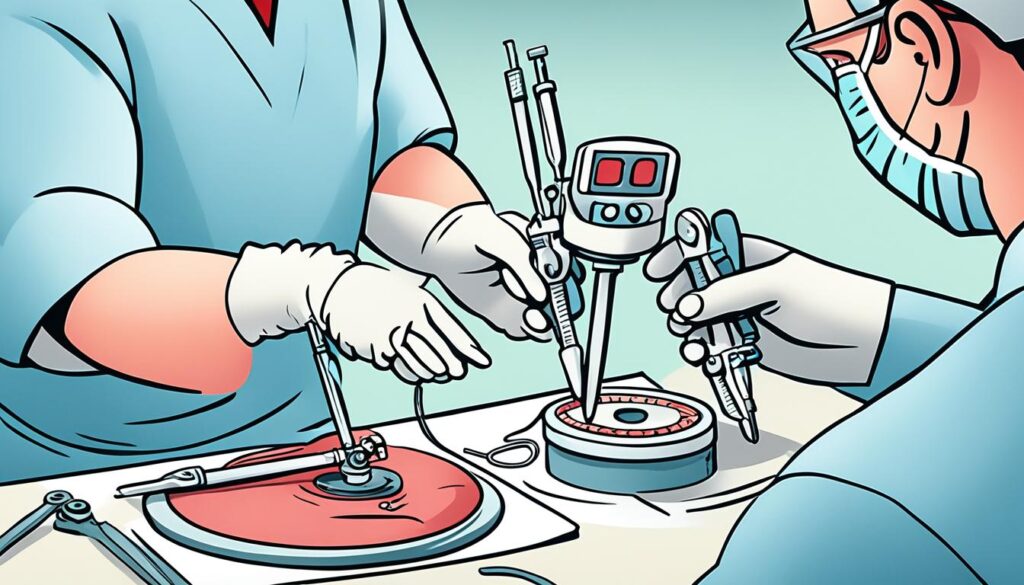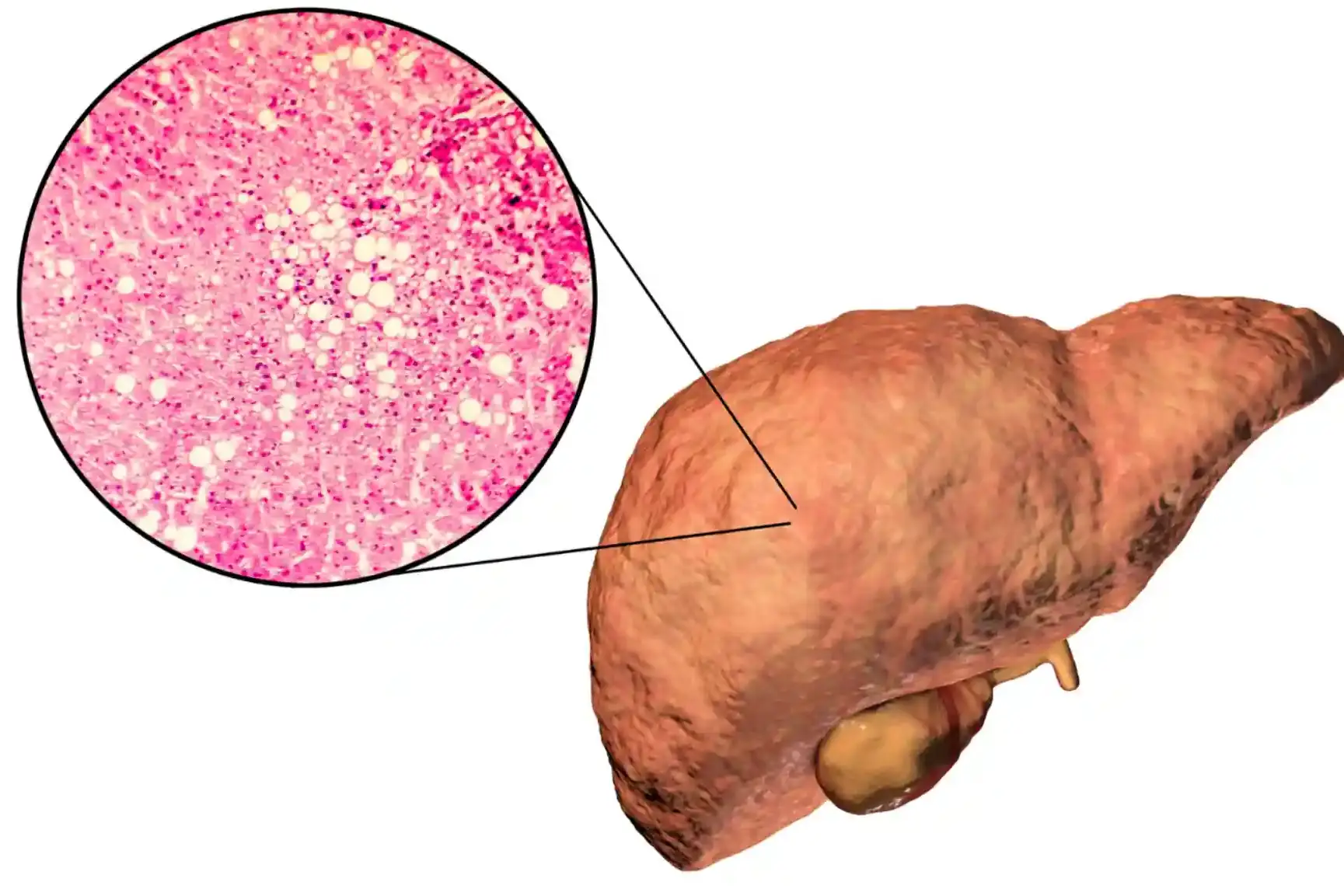Gastric cancer, or stomach cancer, is very serious and needs full treatment. The way doctors treat it depends on where it is in the stomach and the patient’s health. This cancer usually starts in the stomach’s inner lining. Then, it can move through the stomach wall and into other organs like the liver, lungs, and bones.
Table of Contents
ToggleFor many, surgery is key in treating gastric cancer. It gives the best shot at beating the cancer for good if it’s not spread too far. Operations like subtotal or total gastrectomy take out part or all of the stomach to remove the cancer. But, not everyone can have surgery. It depends on how much the cancer has spread and the patient’s health.
Along with surgery, chemotherapy, radiation therapy, and other medicines are used. These can be given before or after an operation. They are added to make the treatment plan better, adapting to what each patient needs. The goal is to offer the most effective care based on the stage of their gastric cancer.
It’s vital for patients and their care teams to understand the treatments for gastric cancer. This helps in making smart choices about what to do. With the right info, patients can team up with their doctors to create a full treatment plan. This plan should meet the patient’s specific needs and lead to the best results.
Understanding Gastric Cancer
Stomach cancer, or gastric cancer, starts in the stomach’s inner lining. It can grow through this wall into other organs. This disease can also move to nearby lymph nodes and, further, to places like the liver, lungs, and bones. Doctors place stomach cancers into different groups. This helps them pick the best treatment. The cancer’s stage is key in choosing how to move forward.
What is Gastric Cancer?
Gastric cancer begins in the stomach’s inner lining. It can then break through the stomach’s wall. From there, it might spread to other parts of the body.
Knowing how [gastric cancer] acts is crucial for treatment.
Stages of Gastric Cancer
Doctors classify gastric cancer from stage 0 to stage 4. The higher the stage, the more it has spread to other organs. This staging helps in picking the right treatment for each patient.
Surgical Options for Gastric Cancer
Surgery is a common way to treat stomach cancer. The type of surgery varies based on where the cancer is. There are three main options: subtotal gastrectomy, total gastrectomy, and endoscopic resection.
Subtotal Gastrectomy
With subtotal gastrectomy, doctors remove the part of the stomach with cancer. They also take out any nearby lymph nodes. This is used for cancers in the stomach’s lower part.
Total Gastrectomy
Total gastrectomy removes the entire stomach. It includes taking out nearby lymph nodes and other parts. Doctors do this for cancers in the stomach’s upper part or when the cancer spreads widely.
Endoscopic Resection
Early-stage gastric cancers might be treated with endoscopic resection. Here, a few layers of the stomach are taken out using an endoscope. It’s sent through the throat. This way is good for very early-stage gastric cancer treatment. It is less invasive.

gastric cancer treatment options
Gastric cancer, or stomach cancer, is complex. It needs a wide treatment approach. Chemotherapy is a key treatment. It is used at different disease stages.
Chemotherapy Drugs for Gastric Cancer
Chemotherapy is a common part of treating gastric cancer. It is used with or without surgery. Popular chemotherapy drugs for gastric cancer are:
- Capecitabine
- Cisplatin
- Docetaxel
- Doxorubicin
- Epirubicin
- Fluorouracil (5-FU)
- Irinotecan
- Leucovorin
- Oxaliplatin
- Paclitaxel
- Trifluridine/tipiracil
Radiation Therapy for Gastric Cancer
Besides chemo, radiation therapy is vital for treating gastric cancer. It uses high-energy x-rays. The aim is to kill the cancer cells or stop them from growing. External beam radiation therapy may be used. A machine outside the body aims radiation at the cancer area.
Targeted Therapy for Gastric Cancer
In recent years, new treatment for gastric cancer has emerged. It includes therapies that aim at specific cancer cells. These have improved outcomes for patients with certain profiles. Examples of these treatments include ramucirumab, regorafenib, trastuzumab, and trastuzumab deruxtecan.
HER2-Targeted Therapy
If a patient’s gastric cancer is HER2-positive, HER2-targeted treatments might be used. Trastuzumab (Herceptin) is one example. It can help some people with advanced, HER2-positive stomach cancer live longer. It’s often taken once every 2 to 3 weeks with chemotherapy. There are also similar versions of trastuzumab available.
Biomarker Testing for Targeted Therapy
Biomarker tests can predict how a patient might respond to certain targeted treatments. For instance, Fam-trastuzumab deruxtecan can help with HER2-positive stomach cancer. This is usually after trastuzumab was first tried. Ramucirumab is another option for advanced stomach cancer. It’s given by IV once every two weeks.
There are also treatments like larotrectinib and entrectinib. These target the TRK proteins and can treat cancers with NTRK changes. They are taken as pills once or twice daily by patients with NTRK gene alterations.

Immunotherapy for Gastric Cancer
Immunotherapy is a hopeful option for those with gastric cancer. It lets the body’s own defenses fight the cancer. Drugs like nivolumab and pembrolizumab are part of this. These drugs attack cancer cells in unique ways. Because they aim at specific changes in the cancer, they are also known as targeted therapy.
Testing with biomarkers can show if a drug will work for a patient. For instance, high levels of the protein PD-L1 can mean nivolumab and pembrolizumab might help. There’s a lot of work being done to see how well immunotherapy works for stomach cancer. This includes using it on its own and with other kinds of treatments.
About 26,000 new cases of stomach cancer are expected in the US in 2023. Sadly, around 11,000 people are likely to die from it. Worldwide, almost a million new cases are found each year. This leads to 780,000 deaths annually. Unlike many other cancers, stomach cancer is often found early. When caught early, through screenings in high-risk areas, survival chances are much better. However, if the cancer has spread, the odds are very slim, with only a 5% chance of surviving five years after it has metastasized.
There are six FDA-approved immunotherapy treatments for stomach cancer right now. These include several types of drugs. Ongoing studies are looking into combining immunotherapy with other treatments. Clinical trials aim to find new and better ways to help those fighting gastric cancer.
Multimodal Treatment Approach
Gastric cancer often needs many treatments together. This mix helps get the best results for patients. It includes steps like neoadjuvant and adjuvant therapies.
Neoadjuvant Therapy
Before gastric cancer surgery, neoadjuvant therapy might be done. Treatments like chemo aim to make the tumor smaller. This step can help surgery go better and have a good effect.
Research shows neoadjuvant treatment is good for some patients. It can remove the whole tumor and lead to better long-term survival.
Adjuvant Therapy
After surgery, adjuvant therapy might start. This includes chemo, to kill any leftover cancer cells. It aims to lower the chance of the cancer coming back.
Big studies found adjuvant therapy helps patients a lot. It can increase the time without cancer and improve overall survival, especially for those with advanced cancer.
The treatments can change based on different things, like cancer stage and patient health. Talking with the cancer care team helps find the best plan for each patient.

Managing Gastric Cancer Symptoms
Gastric cancer can lead to tough symptoms. They really affect how someone lives. Treatment often uses a stent or a feeding tube to help.
Endoluminal Stent Placement
If cancer makes it hard to eat or block the stomach, a stent might help. A surgeon puts a stent in to let food pass through. This helps with swallowing and stops blockages.
Feeding Tube Placement
Some gastric cancer patients may need a feeding tube. This goes straight to the stomach. It’s for getting nutrients easily when eating is hard. Feeding tubes keep up strength during treatment for gastric cancer.
With stents and feeding tubes, doctors can make life better for those with gastric cancer. These steps are key in managing the disease’s symptoms.
Clinical Trials for Gastric Cancer
For some patients with gastric cancer, joining a clinical trial might help. These trials aim to make treatments better or find new ones. The National Cancer Institute and others offer info on where to find these trials.
In a study called GLOW, 507 patients from 18 countries looked at how well zolbetuximab works with CAPOX. They found out that this mix reduced the risk by 31% of the cancer getting worse or causing death. Those getting zolbetuximab went 8.21 months without the cancer growing, which was better than the 6.8 months for those not getting it.
Zolbetuximab with CAPOX also made it less likely for patients to die. There was a 23% lower risk of death with this combo. Survival rates were better at 2 years for those on zolbetuximab, which was 29%, rather than just 17% for those without it.
Gastric cancer is tough, especially for those with cancer that has spread, with a low survival rate. But, studies like GLOW are looking for new ways to help. It’s good to talk with your doctor if you’re thinking of joining a clinical trial.
Follow-up and Monitoring
After you get treatment for gastric cancer, like surgery, chemotherapy, or radiation, doctors will watch how you’re doing. They might do tests again to see if the treatment worked right. These tests tell the doctors if they should keep, change, or stop your treatment.
Your team might also do blood tests often to look for specific markers. If these markers go up, it could mean the cancer is coming back. But sometimes, there are no other signs. Keeping an eye on these tumor markers is a big part of care after treatment.
If you had surgery or endoscopic resection, getting regular endoscopies may be wise. It lets the doctor check the stomach closely for signs of cancer. How often you need these checks will depend on some things. These include your health risks and past treatments.
Staying in a follow-up program helps find any problems early. Early treatment can help a lot. So, keeping up with these checks is a key part of after-care and staying healthy.
Racial and Ethnic Disparities in Treatment
Research shows big differences in cancer care based on race. Many things can affect this, like if a person has insurance or their job. Even the type of cancer might play a role. Everyone should be able to get good care for their cancer, no matter who they are.
One study looked at over 500,000 people with cancer in their stomach or intestines. It found a big gap between Black and White patients. Most were between 60 and 69 years old when they were diagnosed.
Black patients often didn’t get enough surgery or were missing needed treatments, like chemotherapy. This meant their chances of getting better were lower. Not getting right care can be a big problem for anyone fighting cancer. We need to fix this and make sure all patients get the care they need.
Conclusion
In recent years, gastric cancer treatment has advanced. These include new surgeries, chemotherapy, and more. Doctors work in teams to pick the best plan for each person. They look at things like cancer stage, location, and the patient’s health. They also keep the patient’s own choices in mind. Even though gastric cancer is hard to treat, research is looking for new options to help patients.
Healthcare providers are trying to make sure everyone gets the best gastric cancer care. It’s important to fight against differences in getting treatments, no matter a person’s background. By joining forces, the medical world can make sure all gastric cancer patients can use the newest treatment options.
In summary, the way we treat gastric cancer is always changing and looking up. This gives patients more hope and choices. To make the best choices, it’s key to know about the most recent news and work closely with a knowledgeable team.
FAQ
What is the treatment for gastric cancer?
The treatment for gastric cancer varies. It depends on the cancer’s stage and location. Common treatments are surgery, chemotherapy, radiation therapy, targeted therapy, and immunotherapy. Doctors often use a mix of these treatments.
How does the stage of gastric cancer affect treatment?
The cancer’s stage shows how big it is and where it has spread. This helps the doctors pick the best treatment. Surgery is enough for early cancers. But more advanced ones need surgery plus chemotherapy, radiation, and targeted drugs.
What are the different types of gastric cancer surgery?
There are several types of surgery for gastric cancer. These include removing part of the stomach, the whole stomach, or using an endoscope for early stages. Doctors may choose the right surgery based on the cancer’s size and location.
What chemotherapy drugs are used for gastric cancer?
Doctors use different drugs for chemotherapy. Some include capecitabine, cisplatin, docetaxel, and more. They choose the drugs based on the stage and type of cancer.
What are the targeted therapies for gastric cancer?
Targeted therapies focus on specific parts of the cancer cells. They include drugs like ramucirumab and trastuzumab. Trastuzumab is good for patients with the HER2 protein in their cancer cells.
How does immunotherapy work for gastric cancer?
Immunotherapy helps the body’s immune system attack the cancer. Drugs such as nivolumab and pembrolizumab target specific changes in the cancer cells. This stops the cancer from growing.
What is a multimodal treatment approach for gastric cancer?
A multimodal treatment uses many treatments together. It can involve neoadjuvant therapy before surgery and chemotherapy after. This approach helps kill the cancer in more ways.
How are gastric cancer symptoms managed?
Doctors can manage symptoms with stent or feeding tube placements. These help with blockages and make sure the patient gets proper nutrition. It improves the patient’s quality of life.
What is the role of clinical trials in gastric cancer treatment?
Some patients might join clinical trials to help improve treatments. These studies test new ways to treat cancer. Patients can get information on trials from the National Cancer Institute.
Are there racial and ethnic disparities in gastric cancer treatment?
Research shows differences in treatment for different racial and ethnic groups. Things like access to care and tumor biology play a role. Every patient should have the same chance for quality care, no matter their background.
About The Author

Medically reviewed by Dr. Nivedita Pandey, MD, DM (Gastroenterology)
Senior Gastroenterologist & Hepatologist
Dr. Nivedita Pandey is a U.S.-trained gastroenterologist and hepatologist with extensive experience in diagnosing and treating liver diseases and gastrointestinal disorders. She specializes in liver enzyme abnormalities, fatty liver disease, hepatitis, cirrhosis, and digestive health.
All content is reviewed for medical accuracy and aligned with current clinical guidelines.
About Author | Instagram | Linkedin





